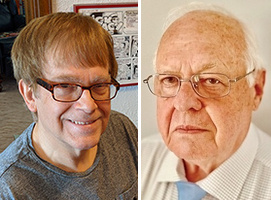 There has never been a full-length biography of Mickey Spillane, the most popular and influential mystery writer of his era --- until now. Max Allan Collins became Spillane’s friend and collaborator, continuing the Mike Hammer series for years after Spillane’s death, building upon unfinished manuscripts he left behind. Now, with co-author James L. Traylor, Collins has produced SPILLANE, the first comprehensive and authoritative profile of the Mystery Writers of America Grand Master. Michael Barson, Senior Publicity Executive at Melville House, talks to Collins and Traylor about the book and their interactions with Spillane.
There has never been a full-length biography of Mickey Spillane, the most popular and influential mystery writer of his era --- until now. Max Allan Collins became Spillane’s friend and collaborator, continuing the Mike Hammer series for years after Spillane’s death, building upon unfinished manuscripts he left behind. Now, with co-author James L. Traylor, Collins has produced SPILLANE, the first comprehensive and authoritative profile of the Mystery Writers of America Grand Master. Michael Barson, Senior Publicity Executive at Melville House, talks to Collins and Traylor about the book and their interactions with Spillane.
Question: Max, what was it like to complete Mickey’s abandoned manuscripts --- first with his input as part of the process, and then with you writing alone?
Max Allan Collins: Mickey and I collaborated on a dozen anthologies, as well as the Mike Danger sci-fi comic book series. He also participated in my Mike Hammer’s Mickey Spillane (1999) documentary. For our anthology PRIVATE EYES (1998), I converted an unproduced radio script of his into a short story, with his input. But we did not work on any novels together during his lifetime. Shortly before he passed, however, he asked me to complete his final Mike Hammer, THE GOLIATH BONE (2008), and instructed his wife Jane to give me his extensive files of unfinished material, saying, “Max will know what to do.”
 Perhaps because of Mickey’s show of confidence, I was not intimidated by the task. The manuscripts ranged from 100 pages to a chapter or two, and finally several synopses of a page or so. Several manuscripts had rough drafts of endings. I try to determine when a manuscript was written and, to prepare, re-read two or three of the Mike Hammer novels from around the same period. I started with the longer manuscripts, although I held a few out for special occasions --- the first, unpublished Mike Hammer novel from 1946 for Mickey’s 100th birthday (KILLING TOWN) and an unproduced Hammer teleplay from around 1954 for the 75th anniversary of Mike Hammer (KILL ME IF YOU CAN).
Perhaps because of Mickey’s show of confidence, I was not intimidated by the task. The manuscripts ranged from 100 pages to a chapter or two, and finally several synopses of a page or so. Several manuscripts had rough drafts of endings. I try to determine when a manuscript was written and, to prepare, re-read two or three of the Mike Hammer novels from around the same period. I started with the longer manuscripts, although I held a few out for special occasions --- the first, unpublished Mike Hammer novel from 1946 for Mickey’s 100th birthday (KILLING TOWN) and an unproduced Hammer teleplay from around 1954 for the 75th anniversary of Mike Hammer (KILL ME IF YOU CAN).
I don’t try to imitate the Spillane style, focusing instead on being true to the Hammer character. The object is not pastiche, but collaboration.
Q: James, in the course of your many interviews with Spillane, was there one particular “get” that provided you with surprising information about his career?
James L. Traylor: Two features stand out: Mickey’s love for the classics, and his ability to use his “standard” and well-thought-out responses to interviewers to make them look silly and him look good. I remember well Mickey telling me about writing the Classics Illustrated Comic of “The Count of Monte Cristo.” His comic book version even reads like a Mike Hammer adventure. I had no idea that as a youth he read Alexander Dumas and Anthony Hope. Mickey loved words and the craft of writing. He always surprised his readers.
Q: Max, can you describe what Mickey’s reaction was when he learned he’d been selected as a Grand Master by Mystery Writers of America in 1995?
MAC: He was, of course, pleased, as a considerable contingent in the organization had lobbied against him over the years, right up to when he received the Grand Master Edgar. The rumor was that he’d been turned down for membership by the organization, but he claimed never to have applied. I think his appearance at the 1981 Bouchercon in Milwaukee was a new beginning for him, where he realized he had a lot of fans among knowledgeable mystery buffs and that a lot of professionals admired him and had been inspired by him. And at the MWA awards banquet itself, he was warmly received and he responded just as warmly, in his unpretentious, blue-collar manner.
Q: James, was there one area of Mickey’s early life and times that remained frustratingly elusive in the course of your extensive research?
JLT: The big question from the early years was always this: Why did Mickey quit writing after KISS ME, DEADLY? The answer turned out to be as simple as Mike Hammer’s answer to the big question of I, THE JURY. Simply put, his contract with film producer Victor Saville included a right to option future novels. Once Spillane processed this fact, he froze out Saville, who he'd come to despise, from any additional income by simply not writing about Hammer until the contract expired.


